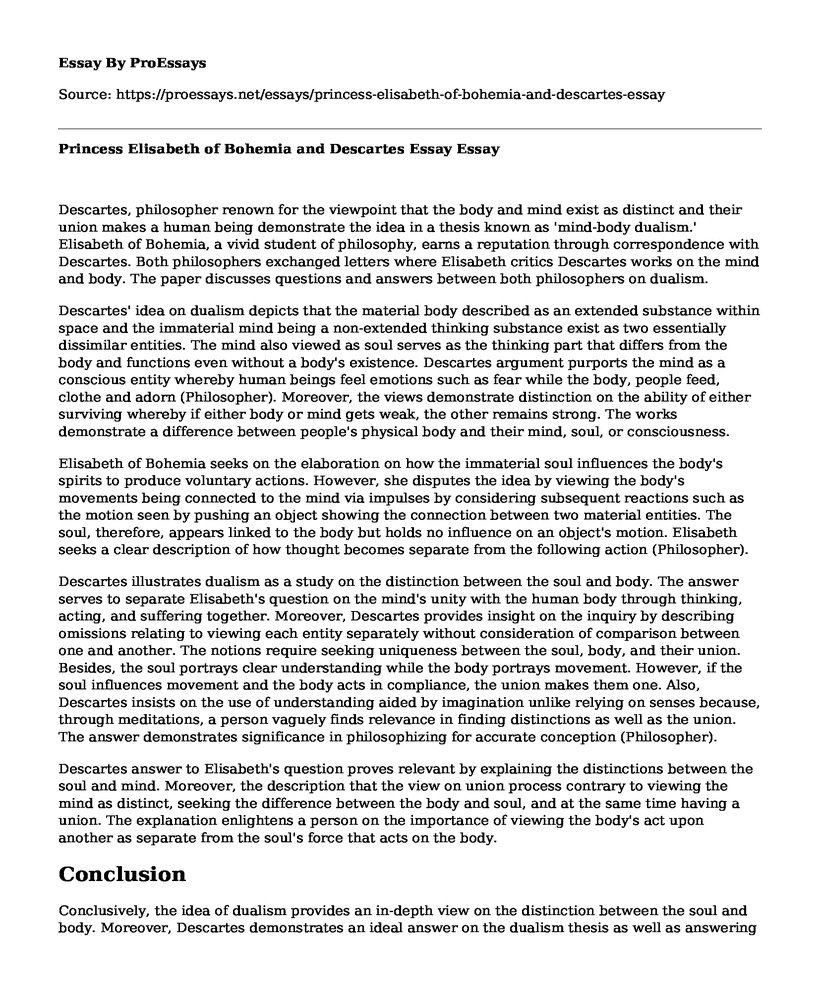Descartes, philosopher renown for the viewpoint that the body and mind exist as distinct and their union makes a human being demonstrate the idea in a thesis known as 'mind-body dualism.' Elisabeth of Bohemia, a vivid student of philosophy, earns a reputation through correspondence with Descartes. Both philosophers exchanged letters where Elisabeth critics Descartes works on the mind and body. The paper discusses questions and answers between both philosophers on dualism.
Descartes' idea on dualism depicts that the material body described as an extended substance within space and the immaterial mind being a non-extended thinking substance exist as two essentially dissimilar entities. The mind also viewed as soul serves as the thinking part that differs from the body and functions even without a body's existence. Descartes argument purports the mind as a conscious entity whereby human beings feel emotions such as fear while the body, people feed, clothe and adorn (Philosopher). Moreover, the views demonstrate distinction on the ability of either surviving whereby if either body or mind gets weak, the other remains strong. The works demonstrate a difference between people's physical body and their mind, soul, or consciousness.
Elisabeth of Bohemia seeks on the elaboration on how the immaterial soul influences the body's spirits to produce voluntary actions. However, she disputes the idea by viewing the body's movements being connected to the mind via impulses by considering subsequent reactions such as the motion seen by pushing an object showing the connection between two material entities. The soul, therefore, appears linked to the body but holds no influence on an object's motion. Elisabeth seeks a clear description of how thought becomes separate from the following action (Philosopher).
Descartes illustrates dualism as a study on the distinction between the soul and body. The answer serves to separate Elisabeth's question on the mind's unity with the human body through thinking, acting, and suffering together. Moreover, Descartes provides insight on the inquiry by describing omissions relating to viewing each entity separately without consideration of comparison between one and another. The notions require seeking uniqueness between the soul, body, and their union. Besides, the soul portrays clear understanding while the body portrays movement. However, if the soul influences movement and the body acts in compliance, the union makes them one. Also, Descartes insists on the use of understanding aided by imagination unlike relying on senses because, through meditations, a person vaguely finds relevance in finding distinctions as well as the union. The answer demonstrates significance in philosophizing for accurate conception (Philosopher).
Descartes answer to Elisabeth's question proves relevant by explaining the distinctions between the soul and mind. Moreover, the description that the view on union process contrary to viewing the mind as distinct, seeking the difference between the body and soul, and at the same time having a union. The explanation enlightens a person on the importance of viewing the body's act upon another as separate from the soul's force that acts on the body.
Conclusion
Conclusively, the idea of dualism provides an in-depth view on the distinction between the soul and body. Moreover, Descartes demonstrates an ideal answer on the dualism thesis as well as answering Elisabeth's questions. The solution provided clarifies the immaterial and material nature of the soul and body.
Works cited
Philosopher, The. "The Princess And The Philosopher: Princess Elisabeth Of Bohemia's Denial Of Substance Dualism". The Oxford Philosopher, 2018, https://theoxfordphilosopher.com/2014/10/28/the-princess-and-the-philosopher-princess-elisabeth-of-bohemias-denial-of-substance-dualism/. Accessed 1 Aug 2018.
Cite this page
Princess Elisabeth of Bohemia and Descartes Essay. (2022, Jul 20). Retrieved from https://proessays.net/essays/princess-elisabeth-of-bohemia-and-descartes-essay
If you are the original author of this essay and no longer wish to have it published on the ProEssays website, please click below to request its removal:
- Evaluation of Ethical Considerations for Independent Scholars Within the Doctoral Research Process
- State of Consciousness Essay Example
- Delivering Negative News Essay
- Article Analysis Essay on 'The American Dream, Quantified at Last.'
- Essay Example on Plato's Blueprint for Democracy: Aristocracy for Tyranny Prevention
- Essay Example on John Stuart: Mastermind Behind Utilitarianism for a Better Society
- Free Essay Example on Code of Ethics in Texas







